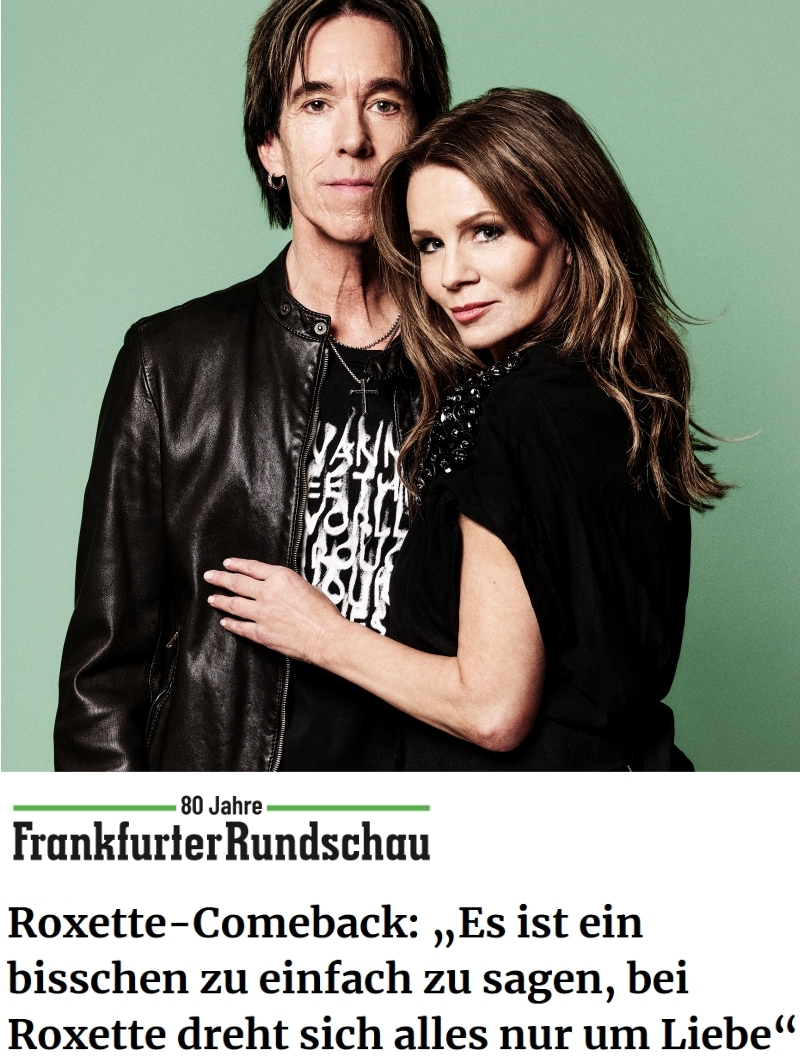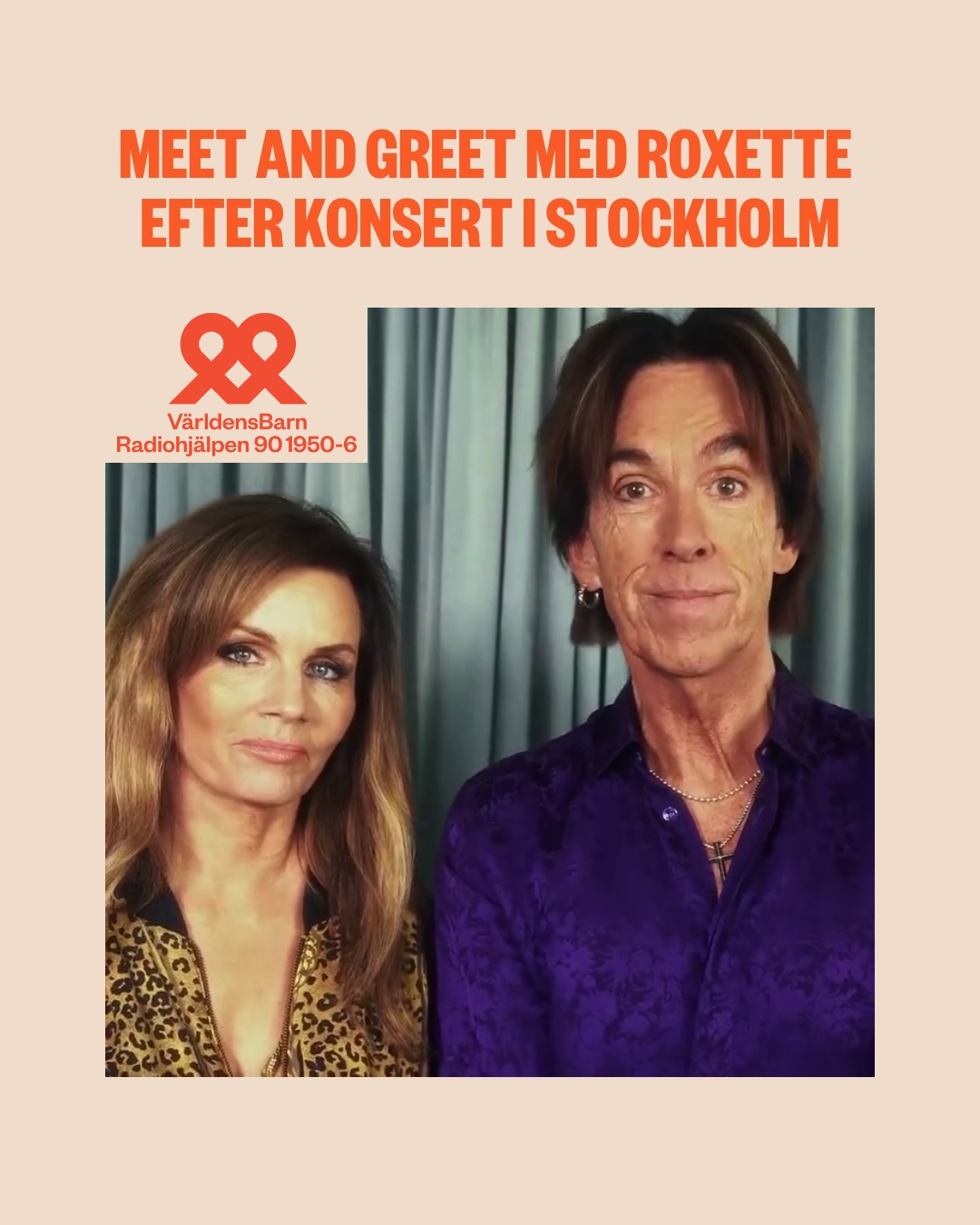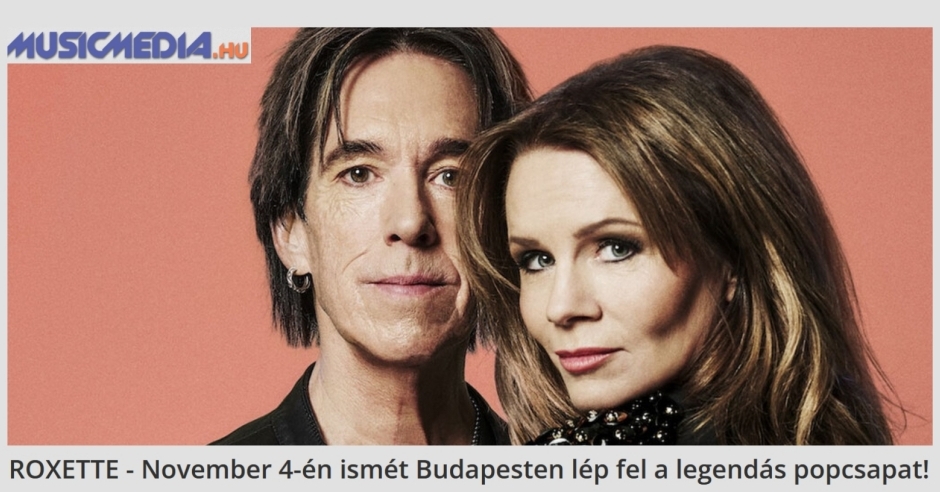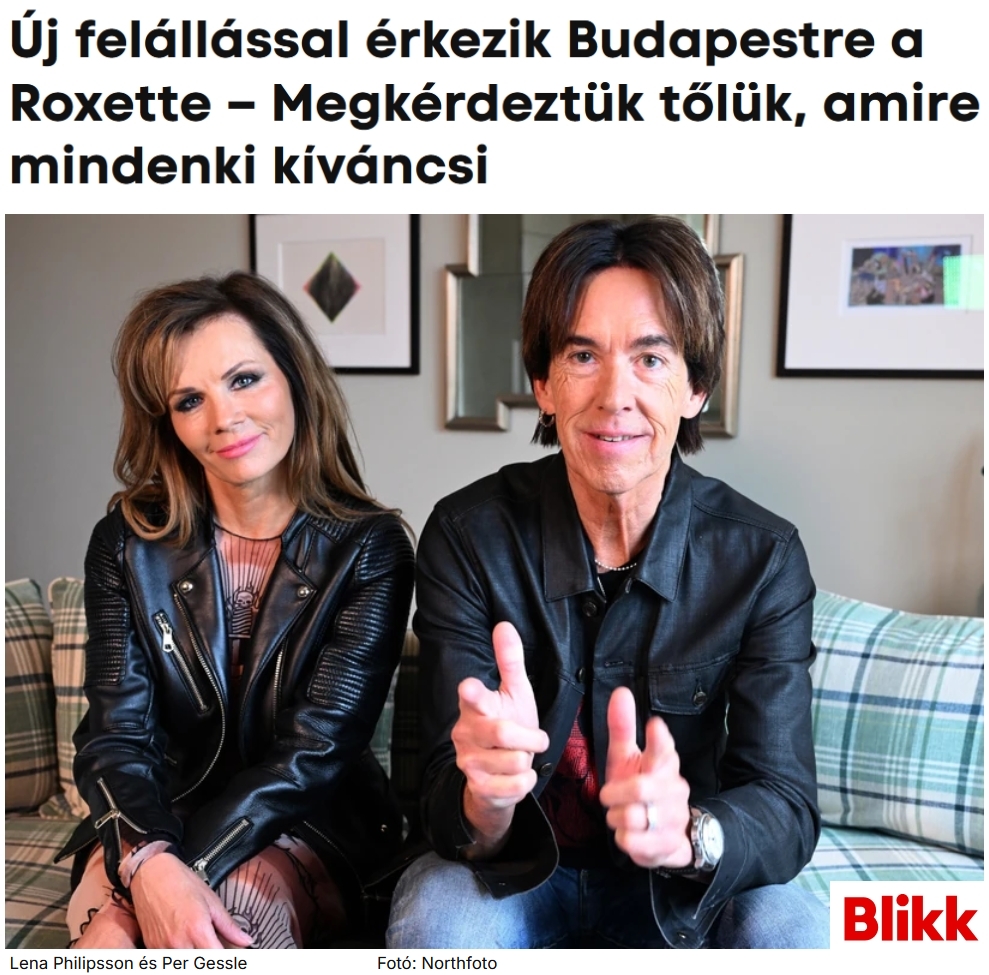Boris Halva from Frankfurter Rundschau did an interview with Per and Lena on their press day in Cologne, Germany.
Boris Halva: – Per, when did you first feel like you wanted to return to the stage with Roxette?
Per Gessle: – It took quite a while. After we decided to end Roxette in 2016, I wasn’t sure how things would go. I then talked to Marie about her thoughts. She said I could do whatever I wanted, probably because she knew I wouldn’t do anything with Roxette that wasn’t in line with her wishes. When she passed away in 2019, I let a few years pass. And at some point, I realized that I really missed playing Roxette songs. They are simply an important part of my life.
BH: – You played those songs for three decades, a long time.
PG: – Absolutely. And I knew that if I were to play those songs again, I would have to start from scratch. Coincidentally, I was recording a Swedish album with a lot of duets at the time, and one of my singing partners was Lena. When I was working with her in the studio, I realized that she has what it takes to sing Roxette songs, because you have to be a truly fantastic singer to bring those songs to stage. Especially because that also means replacing Marie. That’s a huge challenge. So I called Lena and asked if we could meet – and when we met, I asked her, “What do you think about going on tour with me and playing the old Roxette songs?”
BH: – And what did you think, Lena?
Lena Philipsson: – My first thought was also – Per just said it – that this was a really tricky situation. Precisely because I would be replacing Marie, which might not go down well with the fans…
BH: – Do you know what the fans think about it?
PG: – When we announced it, there were, of course, some fans who didn’t know what to think about Lena singing those songs. But most people who came to the concerts were thrilled by Lena’s talent and the way we pay homage to Roxette’s legacy together. And that doesn’t surprise me, because anyone who has never seen or heard Lena on stage will definitely be surprised.
BH: – So, Lena, you don’t regret joining Roxette despite your initial doubts?
LPh: – No, I was very flattered that Per asked me – and I quickly realized I wasn’t going to say no. I also found it exciting; I liked the feeling of embarking on an adventure. And once I accepted, I immediately focused on the work and simply put everything else aside.
BH: – Aside from the thrill of the adventure: Was it harder to find your place in the band – or to accept that you would always be “the other singer”, in a way part of an illusion?
LPh: – It was both at the same time: integrating myself into an existing project and being myself, staying myself, while still showing respect to Marie, the songs, the fans – everything that defines Roxette. I listened to the songs in the original recordings over and over again to really learn every phrase so that it would sound the way it should for the audience. Because the truth is, I’m new to the band, and I thought that was enough change on stage. So I’m staying as close to the original as possible. I want it to seem as natural as possible, that I’m here where Marie was. And somehow still is. I want her to be proud of what’s happening here and say, “Yes, that’s exactly how it should be!” That’s what it’s all about for me.
BH: – Your first tour took you to Australia and South Africa in the spring. Did the distance from Sweden make it easier to make a fresh start on stage with Roxette?
PG: – Yes, in retrospect, it was a really good idea. Lena is very well-known in Sweden, and people associate certain things and songs with her. Performing so far away had the advantage of removing all that. So we could go for the knockout in the first round, so to speak. And those shows were fantastic! Logistically, they were tricky, because it was the first time we were on stage together and we didn’t really know how each other would behave. I thought, ‘Ah, she goes left in “Dressed for Success”, good to know…’
LPh: – Although that wasn’t really about choreography, it was more about getting to know each other on stage, recognizing the patterns.
PG: – We also interact with the audience, quite naturally, at a certain point in the song. But sometimes we both tried to do it at the same time, which is totally unnecessary. You can’t really rehearse something like that, but it worked out wonderfully. And my teeth are all still okay, even though we bumped into each other quite a bit now and then… Hahaha.
LPh: – I just always put my hand on Per’s shoulder now when I’m standing behind his back, so he doesn’t suddenly turn around and knock me over with his guitar!
BH: – Sounds like you’re having fun…
LPh: – Oh yes, we are!
PG: – And it’s really great to have the classic Roxette band together again, at least the ones who are still alive, all those old friends we played with on the big tours. And for them, it’s great to have Lena on stage. Everyone is happy, has a smile on their face. It’s like it used to be.
BH: – Per, Roxette’s music has been part of the pop universe for almost four decades. You wrote those songs in the ’80s and ’90s, which were quite optimistic and carefree, especially in Europe. The songs are the same, but the world has changed dramatically. When you play the songs today, doesn’t it sometimes feel like your music is out of date?
PG: – It depends. I remember, as a child, always talking to my parents about what they were like in their 20s and 30s and what it was like for them 30 years later. I guess that’s true for every generation. But I also know that I wouldn’t be able to write those songs the same way today: not only because I’m older, but also because that kind of music wouldn’t work the same way anymore. People don’t write songs the way they used to. It’s a completely different thing. What we did in the ’80s and ’90s was totally coherent and unique, just like Bryan Adams did something completely unique, and we still benefit from that because there’s nothing comparable. Or when was the last time you heard of a rock band that started in some basement and became big? That doesn’t exist anymore.
LPh: – So I can totally understand why people want to reconnect with the feeling they had back then through songs from earlier times.
PG: – Yes, exactly! But for today’s generations, I think it’s completely different, because pop culture was so present in the ’60s and ’70s, everything was interconnected: art, fashion, film, theatre, photography, music, poetry – pop culture was powerful and had a much greater influence on society. Today, everything is so polarized, and everyone is constantly busy with this (holds up his smartphone). You keep in touch with your friends, but you only check the news you want to read. It’s a completely different way of life. That’s why I think it’s really difficult for artists today to build a repertoire like Roxette’s. And that’s not because Roxette is better, but because of the environment, the way things work today. That’s perhaps one of the reasons why we still sell so many tickets. As you said, Lena, people want to hear these songs. Those who grew up with these songs miss this music.
BH: – Speaking of teenage years: Per, your first band was a punk band. You refused military service – sounds like a rebel at first. How did this rebel start singing about love and heartbreak instead of criticizing politics and the system?
PG: – I’d say every teenager is a rebel, but I wasn’t really one. I was always a fan of melodic pop music, even when I was very young. My older brother taught me a lot about the sixties, “Love” and “Small Faces” and things like that. And when I got my first guitar, I played glam rock, T. Rex and Bowie, Led Zeppelin. But for me, it was always about melodies and atmosphere, the combination of melody and lyrics. I started writing lyrics long before I started making music; I’ve always been interested in poetry and song lyrics. Do you remember, Lena, your first lyric was written by me?
LPh: – Yes, I know.
PG: – It wasn’t that good…
LPh: – But the song was good.
PG: – You were good!
LPh: – Good enough, I’d say…
BH: – So you jumped straight into the music business – or did you learn something sensible beforehand, as they like to say in Germany?
PG: – It depends on how you look at it. Basically, pop music has been everything in my life since I was six or seven. I didn’t have many friends. I always had my headphones on, listening to music, writing something. A school friend happened to be playing in a band, and I went to a rehearsal with him – and that completely changed my life. I was standing in this small room, the band was making a hell of a racket, and I thought, “This is exactly what I want to do!” And the drummer, Mats, became my first real friend. Together we formed Gyllene Tider, which became the biggest band in Sweden in 1980. We wrote the songs together, I wrote the lyrics, and we did a lot of promotion, sending cassettes to radio stations and labels. Björn and Benny from ABBA turned us down, but eventually we got a record deal with EMI, and the first single became a number one hit. We had only played six shows in front of an audience before we reached number one in the charts. So it happened very quickly – and was over very quickly, too. Four years later, I was more or less left with nothing: the band broke up, and I recorded a few solo albums that weren’t so well received. And then, in 1986, Marie and I came up with the idea of ??founding Roxette. And the rest is history.
BH: – Speaking of history: In recent years, there have been repeated discussions, especially in the US, because some musicians and singers didn’t want their songs played at political party campaign events. Do you also receive requests from people who want to use your songs for campaigns whose goals or stances you don’t share?
PG: – It happens, not often, but it does happen. But when people ask me if they can use my songs, I always say no.
BH: – Why so categorical?
PG: – Because I don’t want to stand up for something I know nothing about. Especially when the request comes from another country where I don’t know how things work, because I don’t live there. Sometimes they use the songs anyway, which I find really annoying, because you should respect the person who wrote the song. Additionally, I’m not a particularly political person, and it’s not because I don’t have any interest. I just don’t want to put my energy into political discussions. I never have, not even when I was younger. I’ve never officially spoken out in favour of this or that. But I do support certain things that I think are important.
BH: – For example?
PG: – If the soccer club in my town needs a bigger budget, because otherwise they can’t equip a new team of kids, things like that. But I don’t support any political ambitions or goals. I never really felt ready for it either, because I know that – especially when you’re famous or a public figure for whatever reason – the things you say mean so much to people you don’t know. I find that quite intimidating. I think as a star, you have to be careful and know what you’re doing and what you’re saying. I’m not saying this is the right path, it’s just the path that felt natural to me. Some people say loud and clear: I support this, I support that – and that’s fine. But that’s not who I am.
BH: – So you’ll continue to write and sing about love, heartbreak, and joyrides in convertibles…
PG: – It certainly seems so. But it’s not as one-dimensional as you make it out to be. Of course, hits like “Heartbreak”, “Love Gone Lost” or “Love Affair” are about love. But my songs are also about life, about loneliness, and what it does to you. Especially in my Swedish songs – I’m simply better at writing in Swedish than in English – I write a lot about my childhood, my parents, the things that have happened in my life. And it’s also a bit too simplistic to say that Roxette is all about love. Because it’s more than that. Also because working with Marie definitely changed my songwriting.
BH: – In what way?
PG: – Not only was I able to write better melodies after we started Roxette. I also started writing lyrics from a different, female perspective, which was challenging for me. Sometimes while writing, I thought maybe I should use a different word. Or I’d call Marie and ask, “What do you think of that sentence?” And she’d say, “No, that doesn’t suit me”, so I changed it. She always asked this question: What’s the other person like? What do they have that I don’t?
BH: – So it’s about empathy?
PG: – Exactly. But this “What’s the other person like, what do they feel, what do they want?” question is an important one anyway, not just when a relationship breaks down. But I don’t always overthink it; I just write it down. And you never know when you write something if it will work. You never know if it will touch people. You’re basically always writing it for yourself. And to find some kind of meaning in this little bubble you’re in by writing this song. You try to do your best and make it make sense somehow. And above all, you have to start from scratch every time.
All interview text is written by Boris Halva for Frankfurter Rundschau in German. Here it is a translation by RoxBlog.
Photo by Fredrik Etoall





